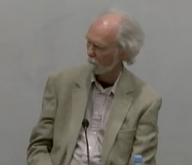Barry Buzan

Barry Gordon Buzan (* 28. April 1946 in London) ist ein emeritierter Professor der Internationalen Beziehungen an der London School of Economics (LSE) und Honorarprofessor an der Universität Kopenhagen sowie der Jilin-Universität. Bis 2012 war er Montague Burton Professor of International Relations an der LSE. Er entwickelte die Regional Security Complex Theory und ist gemeinsam mit Ole Wæver eine zentrale Figur der Copenhagen School of Security Studies.
Leben
Buzans Familie emigrierte 1954 nach Kanada. Er besitzt sowohl die britische als auch die kanadische Staatsbürgerschaft. Er verfügt über einen Abschluss an der University of British Columbia (1968) und promovierte im Jahr 1973 an der LSE. Er beschreibt seine politischen Ansichten als „social democratic“ und seine religiösen Ansichten als „extreme secularist“.
Von 1988 bis 2002 war er Projektleiter am Copenhagen Peace Research Institute (COPRI). Von 1995 bis 2002 war er research Professor of International Studies an der University of Westminster und davor Professor of International Studies an der University of Warwick. 1993 war er visiting professor an der International University of Japan und 1997/1998 Olof Palme Visiting Professor in Schweden.
Von 1988 bis 1990 war er Vorsitzender der British International Studies Association, von 1993 bis 1994 Vize-Präsident der (North American) International Studies Association und von 1994 bis 1998 founding Secretary des International Studies Coordinating Committee. Von 1999 bis 2011 war er Koordinator eines Projekts zur Wiederbelebung der Englischen Schule und von 2004 bis 2008 Herausgeber des European Journal of International Relations. 1998 wurde er zum Fellow der British Academy und 2001 an die Academy of Learned Societies for the Social Sciences berufen.
Buzans Frau, Deborah Skinner, ist Künstlerin und die jüngste Tochter des Psychologen B. F. Skinner.[1] Sein Bruder ist der Autor Tony Buzan.
Forschungsschwerpunkte
- Konzeptionelle und regionale Aspekte der International Security
- Internationale Geschichte und die Evolution des International System seit der Prähistorik
- Die Theorie der Internationalen Beziehungen, insbesondere des Strukturellen Realismus
- International Society und die Englische Schule
Veröffentlichungen (Auswahl)
- People, States & Fear: The National Security Problem in International Relations (1983; überarbeitete 2. Auflage 1991)
- The Logic of Anarchy: Neorealism to Structural Realism (1993) mit Charles Jones und Richard Little
- Security: A New Framework for Analysis (1997) mit Ole Waever, Jaap De Wilde
- The Arms Dynamic in World Politics (1998) mit Eric Herring
- The Mind Map Book (2000) mit Tony Buzan
- Regions and Powers: The Structure of International Security (2003) mit Ole Waever
- The United States and the Great Powers: World Politics in the Twenty-First Century (2004)
- The Evolution of International Security Studies (2009) mit Lene Hansen
- Non-Western International Relations Theory: Perspectives on and beyond Asia (2010) mit Amitav Acharya
- An Introduction to the English School of International Relations: The Societal Approach (2014)
- mit George Lawson: The Global Transformation: History, Modernity, and the Making of International Relations. (2015)
- Making Global Society: A Study of Humankind Across Three Eras. Cambridge University Press, Cambridge 2023, ISBN 978-1-009-37219-0.
Weblinks
- Eintrag zu Barry Buzan im Personenlexikon der internationalen Beziehungen virtuell (PIBv), Herausgegeben von Ulrich Menzel, Institut für Sozialwissenschaften der Technischen Universität Braunschweig
Einzelnachweise
- ↑ Archivlink ( vom 16. Februar 2015 im Internet Archive)
| Personendaten | |
|---|---|
| NAME | Buzan, Barry |
| ALTERNATIVNAMEN | Buzan, Barry Gordon (vollständiger Name) |
| KURZBESCHREIBUNG | britischer Hochschullehrer |
| GEBURTSDATUM | 28. April 1946 |
| GEBURTSORT | London |
Auf dieser Seite verwendete Medien
Autor/Urheber: SOAS University of London, Lizenz: CC BY 3.0
Professors Barry Buzan and Amitav Acharya in conversation with Dr. Dan Plesch about their research and work editing the groundbreaking book "Non-Western International Relations Theory: Perspectives On and Beyond Asia", chaired by Dr Meera Sabaratnam. The work argues that given that the world has moved well beyond the period of Western colonialism, and clearly into a durable period in which non-Western cultures have gained their political autonomy, it is long past time that non-Western voices had a higher profile in debates about international relations, not just as disciples of Western schools of thought, but as inventors of their own approaches.
